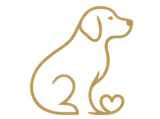What Is The Best Treatment For My Golden Retriever CHF Condition?

Imagine this. Your once energetic dog is now sluggish and often has trouble breathing. Sounds alarming, right? A deadly condition might be the reason behind these symptoms. Congestive heart failure in dogs is actually a critical problem that needs proper treatment for favorable outcomes.
We are going to talk about congestive heart failure treatment in depth in this article. But here is the catch: seeing your dear furry companion experience CHF can be nerve-wracking.
The good news? Canines can still live comfortably with the right approach. This article explores dog heart failure medication, lifestyle modifications, cutting-edge procedures, surgery, and support therapies. It empowers you with the knowledge to make decisions and provide the best dog heart failure care.
Table of Contents
What Is CHF In Golden Retrievers?
Congestive heart failure (CHF) in golden retrievers occurs when the heart cannot properly circulate blood, and fluid starts to accumulate in the lungs and other organs. Here are the symptoms:
- Persistent coughing
- Shortness of breath
- Decline in stamina and physical activity
It is crucial to timely identify congestive heart failure symptoms in dogs for better chances of recovery. Understanding CHF helps you manage congestive heart failure effectively. This knowledge enables you to make decisions that improve comfort and survival.
On this basis, let’s discuss the CHF treatment in dogs that can alleviate the suffering.
1. Medication for congestive heart failure in golden retrievers
Drugs are the main treatment for canine congestive heart failure. They enable the heart to work properly, avoid fluid buildup, and increase overall health.
Here are the medicines commonly used:
- Pimobendan
- ACE Inhibitors (e.g., Enalapril)
- Spironolactone
Medicines can help treat a patient by improving the symptoms. But it’s not a good solution to only rely on medicines. A good and positive routine is equally important. Even simple lifestyle changes can contribute to making your adorable little furry friend happy and healthy.
2. Lifestyle Adjustments
Managing CHF in golden retrievers can become a lot easier if you introduce good lifestyle changes in the daily routine of your dog’s life. Try to give them food that is low in sodium, as it can make the cardiac issues worse.
Moreover, a low or moderate body weight also matters a lot. An obese dog has a better likelihood of experiencing health issues because it’s a stress on the heart. Stress can further affect your dog’s overall health. Home should be a welcoming environment for them where the dogs can relax.
If you introduce these lifestyle changes in addition to medication, your dog has a better chance of healing and living healthier. Even with lifestyle changes, some dogs will require interventional procedures to treat structural heart defects and enhance daily function.
3. Interventional Procedures
Certain dogs with structural heart defects can be helped by interventional treatments, including valve repair or balloon valvuloplasty. These methods will enhance heart function, relieve symptoms, and enhance canine congestive heart failure therapy.
These treatments, conducted by veterinary cardiologists, are usually reserved for situations in which medicines and lifestyle changes alone are not enough. Where appropriate, interventional treatment can both improve comfort and extend the longevity of dog heart failure management.
In severe instances, surgery could be the best means of correcting underlying defects in the heart.
4. Surgical Options
In extremely serious situations, surgery is the only possible solution. Expert surgeries enhance heart function and facilitate long-term health. Surgery is always supplemented with dog heart failure drug therapy, lifestyle management, and supportive care to achieve optimal results in dog congestive heart failure treatment.
Regardless of whether surgery is needed, supportive therapies can keep your dog comfortable daily and preserve quality of life.
5. Support Therapies
Support therapies preserve comfort and everyday function in conjunction with dog congestive heart failure treatment. These include:
- Oxygen therapy – Relaxes breathing in episodes.
- Fluid management -Averts lung congestion and swelling.
- Controlled exercise programs -Adapted to energy levels and stamina.
- Nutrition support -Low-sodium diets and adequate fluid intake promote heart wellness.
Supportive care accompanies medications, forming a comprehensive way of managing CHF in golden retrievers and enhancing dog heart failure care.
With a combination of medications, lifestyle changes, procedures, surgery where necessary, and supportive therapies, you can offer a distinctly complete treatment for canine congestive heart failure.
For veterinary professionals, staying updated on the latest advances ensures dogs receive the most effective care. This is where continuing education and modern tools like veterinary scribe software from Acorn.vet play a vital role. Such technology helps streamline clinical documentation, allowing veterinarians to focus more on patient care rather than paperwork.
A Vet and Tech webinar on CHF treatments, led by Dr. Sandra P. Tou, offers veterinary CE and insights into the latest techniques to improve outcomes for canine patients. Attending such events helps vets learn new techniques and strategies to improve outcomes for their dog patients.
Conclusion
Dealing with congestive heart failure in golden retrievers can be overwhelming. Yet with dog heart failure medication, changes in lifestyle, therapy, surgery when needed, and supportive treatments, many dogs can live comfortably.
Always talk to your veterinarian to customize dog congestive heart failure treatment based on your dog’s specific situation. Early intervention and continued care can be the difference-maker. But here’s the good news: With the proper information and guidance, you can lead your dog safely through canine CHF treatment, allowing them to live comfortably and happily.
FAQs
1. Which Drug Is Crucial for Dogs with Heart Failure?
Pimobendan is the most essential dog heart failure drug for CHF. It strengthens heart muscle contractions and dilates blood vessels, which increases blood flow and reduces the heart’s workload. Studies have shown that pimobendan can extend survival in dogs with CHF.
2. How to treat congestive heart failure in golden retrievers?
Treatment for retrievers with heart failure usually involves a combination of several medications, including diuretics like furosemide to remove excess fluid, ACE inhibitors such as enalapril to widen blood vessels, and pimobendan to strengthen heart contractions. Several treatments help manage symptoms and improve quality of life.
3. What are the signs that a dog needs to be treated for CHF?
Signs that a dog will require CHF treatment are chronic coughing, shortness of breath, lethargy, and a pot-bellied appearance due to fluid accumulation. These are signs that the heart is not efficiently pumping blood, and it requires immediate intervention by a veterinarian.






